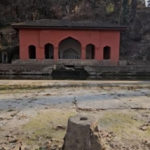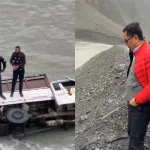If immediate measures are not taken, Kashmir could face a severe water crisis, threatening both its people and its fragile ecosystem
Kashmir often referred to as ‘Paradise on Earth,’ is facing an environmental crisis that threatens its natural beauty and sustainability. Signs of drought-like conditions are becoming increasingly evident, with Achabal Spring drying up, water levels in the Chenab River declining, and the depletion of Kashmir’s wetlands. These alarming changes indicate a growing water crisis that could have severe consequences for agriculture, drinking water supply, biodiversity, and the region’s overall ecological balance.
While climate change is a significant factor, human activities such as deforestation, urban expansion, excessive groundwater extraction, and poor water management have further accelerated the depletion of water resources. If immediate policy measures are not implemented, Kashmir could face a severe water crisis, impacting both livelihoods and the fragile ecosystem.
Climate Change and Rising Temperatures
One of the primary factors contributing to the drying of Kashmir’s water bodies is climate change. Over the past few decades, global warming has altered weather patterns, leading to reduced snowfall and precipitation. Since Kashmir’s water sources largely depend on glacier-fed rivers and natural springs, a decrease in snowfall results in lower water availability during summer. Studies indicate that rising temperatures are causing glaciers to melt at an accelerated rate. However, instead of replenishing rivers and springs, this rapid melting leads to flash floods followed by long-term water shortages as glacial reserves continue to deplete.
Drying Up of Achabal Spring and Declining Chenab River Water Levels
Achabal Spring, a significant freshwater source in Kashmir, is gradually drying up. Historically, this spring has provided a steady supply of drinking water and irrigation support to surrounding areas. However, declining rainfall, groundwater depletion, and climate shifts have led to a significant reduction in its water levels. Similarly, the Chenab River, a crucial water source for the region, is experiencing declining water levels. The excessive diversion of water for hydroelectric projects and irrigation, along with deforestation in catchment areas, has disrupted the river’s natural flow. Reduced forest cover has weakened the land’s ability to retain water, leading to lower groundwater recharge and increased runoff.
Depleting Wetlands of Kashmir
Kashmir’s wetlands, including Hokersar, Wular, and Shallabugh, play a crucial role in maintaining ecological balance by storing excess rainwater, recharging groundwater, and preventing floods. However, rapid urbanization, pollution, and encroachments have led to their degradation. The loss of wetlands not only reduces water availability but also threatens biodiversity, as these ecosystems serve as habitats for migratory birds and aquatic species. Without urgent conservation efforts, Kashmir’s wetlands could disappear, exacerbating the region’s water crisis.
Unregulated Urbanization and Groundwater Depletion
Unplanned urban expansion in Kashmir has led to over-extraction of groundwater to meet rising demands for drinking water and irrigation. The increasing use of borewells and tube wells has significantly reduced underground water reserves, affecting natural springs and streams. Additionally, the proliferation of concrete infrastructure has prevented rainwater from percolating into the soil, reducing groundwater recharge. The absence of strict land-use policies has allowed unchecked construction activities to encroach upon crucial water recharge zones.
Deforestation and Soil Erosion
Forests play a vital role in maintaining water cycles and preventing soil erosion. However, large-scale deforestation for construction, agriculture, and timber trade has severely impacted Kashmir’s water retention capacity. Without adequate tree cover, rainwater runs off quickly instead of seeping into the ground, leading to lower groundwater levels and drier riverbeds.
Poor Water Management and Government Negligence
Despite clear signs of water depletion, Kashmir lacks a comprehensive water conservation policy. Inefficient irrigation techniques, unregulated water usage, the absence of rainwater harvesting, and weak enforcement of environmental regulations have further worsened the crisis. Illegal sand mining from riverbeds has also disrupted the natural flow of water, affecting river stability. Without immediate corrective measures, the region could face severe and irreversible water shortages.
The Need for Urgent Policy Interventions
To mitigate the water crisis, the government must implement a well-structured water conservation policy that includes:
• Rainwater harvesting in urban and rural areas to reduce dependency on underground water.
• Regulated groundwater extraction to prevent depletion of natural springs and streams.
• Efficient irrigation techniques, such as drip irrigation, to minimize agricultural water wastage.
• Strict monitoring of hydroelectric projects to ensure they do not excessively divert river water.
Immediate action is required to protect and restore Kashmir’s wetlands
1. Strict enforcement of land-use laws to prevent illegal encroachments.
2. Pollution control measures to prevent household and industrial waste from contaminating water bodies.
3. Reintroduction of native plant species to improve water retention and biodiversity.
4. Community participation in wetland conservation efforts.
Reforestation and Eco-Friendly Urban Planning
• Afforestation programs should be launched in degraded forest areas to restore water cycles.
• Green urban planning policies must be implemented, ensuring sufficient green spaces for rainwater absorption.
• Strict penalties should be enforced to curb illegal logging and deforestation.
Encouraging Sustainable Agricultural Practices
A. Training farmers in water-efficient irrigation methods to minimize wastage.
B. Promoting crop rotation and soil conservation to retain moisture.
C. Encouraging drought-resistant crops to reduce water dependency.
Strengthening Public Awareness and Community Involvement
• Awareness campaigns should be conducted on water conservation and sustainable resource management.
• Community-led water management programs should be established to involve locals in the conservation of springs, streams, and wetlands.
• School-level environmental education programs should be introduced to instill conservation values in the younger generation.
Legal and Policy Reforms
1. Stronger environmental laws to prevent illegal sand mining, deforestation, and wetland encroachments.
2. Strict water usage policies for industries and construction projects.
3. A dedicated Water Resource Management Authority to oversee conservation efforts and policy implementation.
Conclusion
The drying up of Achabal Spring, the depletion of Kashmir’s wetlands, and the declining water levels of the Chenab River are clear warning signs of an impending water crisis that could severely impact agriculture, biodiversity, and daily life. While climate change plays a role, human-induced factors—such as deforestation, urban expansion, and poor water management—have significantly worsened the situation.
The urgency for policy action cannot be ignored. The government, civil society, and local communities must collaborate to implement sustainable water conservation strategies, restore wetlands, regulate groundwater use, and promote afforestation. If immediate measures are not taken, Kashmir could face a severe water crisis, threatening both its people and its fragile ecosystem. Now is the time for decisive action to ensure that the region’s natural water resources are preserved for future generations.
(The author can be reached at [email protected])







